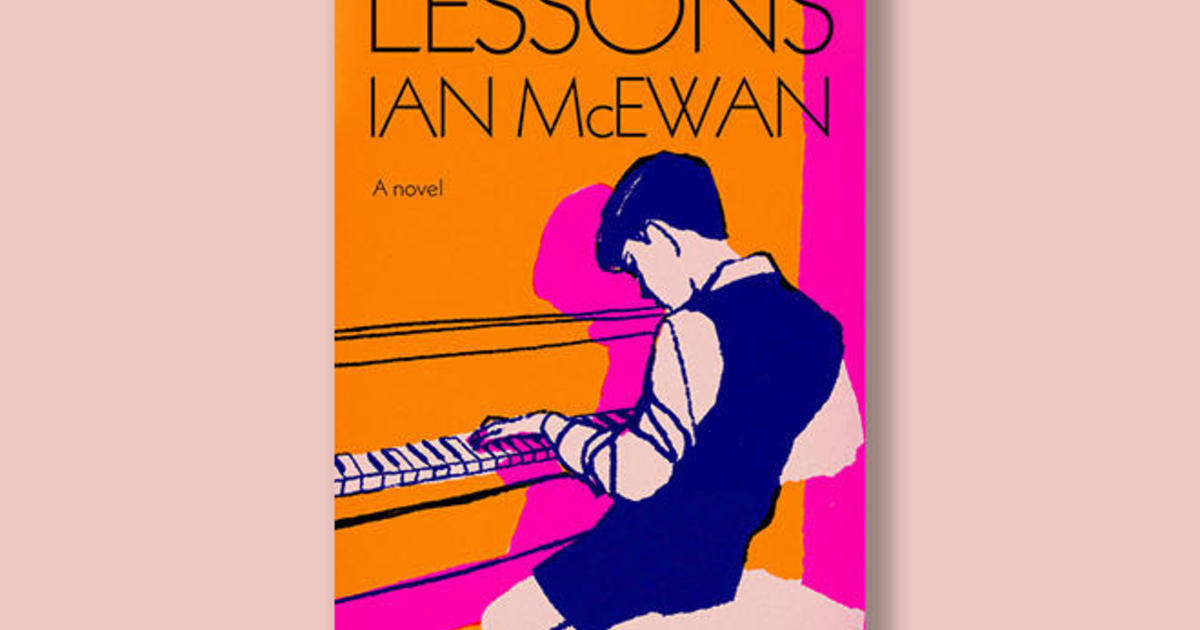Excerpt from the book: “Lessons” by Ian McEwan

Ian McEwan, the Booker Prize-winning author of Amsterdam and Redemption, is back with a new novel, “Lessons” (Knopf), a meandering journey that lasts a lifetime, chronicles love, child sexual abuse, and missed opportunities.
Read the passage below and don’t miss Correspondent Seth Doan’s interview with Ian McEwan on “CBS Sunday Morning” October 30!
Knopf
Part one
It was a sleepless memory, not a dream. There was another piano lesson – an orange-tiled floor, one tall window, a new desk in an empty room next to the hospital. He was eleven years old, attempting to perform what others might know as Bach’s First Prelude from Book One A well-tempered piano, a simplified version, but he knew nothing about it. He didn’t wonder if she was famous or not. There was no when or where. He couldn’t imagine that anyone had ever bothered to write it. The music was just here, school music, or as dark as a pine forest in winter, just for him, his personal labyrinth of cold sadness. It will never let him go.
The teacher was sitting next to him on a long stool. Round-faced, slender, fragrant, strict. Her beauty was hidden behind her manners. She never frowned or smiled. Some guys said she was crazy, but he doubted it.
He made a mistake in the same spot, the one he always made, and she leaned closer to show him. Her hand was firm and warm on his shoulder, her hands, her painted nails, just above his knees. He felt a horrible tingle distracting him.
“Listen. It’s a light ripple.”
But when she played, he did not hear a light ripple. Her perfume overwhelmed his senses and deafened him. It was a rounded, boring scent, like a solid object, a smooth river stone, pressing on his thoughts. Three years later, he learned that it was pink water.
‘Try again.’ She said this in a rising tone of warning. She was musical, he was not. He knew that her mind was elsewhere and that he had bored her with his insignificance – just another inky boy at boarding school. His fingers tapped the jumbled keys. He saw the bad spot on the page before he even got to it, it was happening before it happened, the bug was closing in on him, arms outstretched like a mother ready to grab him, always the same bug coming to take him without the promise of a kiss. So it happened. His thumb had a life of its own.
Together they listened as the bad notes faded into hissing silence.
“I’m sorry,” he whispered to himself.
Her displeasure came in the form of a quick exhale through her nostrils, a return of the sniff he had heard earlier. Her fingers found his inner leg, just at the edge of his gray shorts, and pinched him hard. She would be left with a tiny blue bruise that night. Her touch was cool as her hand moved up under his shorts to where the elastic of his pants met his skin. He grabbed himself from the stool and stood, flushed.
‘Sit down. You start again!’
Her sternness obliterated what had just happened. It was gone, and he was already doubting his memory of it. He hesitated before another one of those blinding encounters with the ways of adults. They never told you what they knew. They have hidden from you the limits of your ignorance. Whatever happened must be his fault, and disobedience was against his nature. So he sat down, raised his head to the gloomy column of treble clefs where they hung on the page, and set off again, even more uncertainly than before. There could be no ripples in this forest. He got too close to that very bad place too soon. Disaster was certain and the realization confirmed it as his idiotic thumb went down when it should have stayed put. He stopped. The lingering discord sounded as if his name had been spoken aloud. She cupped his chin with her fingers and turned his face towards her. Even her breath was fragrant. Keeping her eyes on him, she reached for the twelve-inch ruler from the piano lid. He wasn’t going to let her hit him, but when he slid off the stool, he didn’t see what was waiting for him. She grabbed him by the knee, not flat, but by the edge, and hit him. He took a step back.
“You will do as you are told and sit down.”
His leg was on fire, but he didn’t want to touch it until now. He took one last look at her, at her beauty, her tight pearl-button blouse with a high neck, the fanned diagonal folds of fabric her breasts formed under her proper and steady gaze.
He ran away from her down the colonnade for months until he was thirteen and it was late at night. For several months, she appeared in his dreams before bed. But this time it was different, the feeling was wild, the chill that sank into his stomach was what he guessed people called ecstasy. Everything was new, good or bad, and everything belonged to him. Nothing has ever been as exciting as passing the point of no return. Too late, no turning back, who cares? Surprised, it hit his hand for the first time. Recovering, he sat down in the dark, got out of bed, went into the bedroom toilets, “swamps”, to examine the pale ball on his palm, the children’s room.
Here his memories turned into a dream. He came closer, closer, through the glittering universe to the view from the top of the mountain over the distant ocean, like the one fat Cortez saw in the poem the whole class wrote twenty-five times for detention. A sea of squirming creatures smaller than tadpoles, millions upon millions, crowded the curved horizon. Closer still, until he found and followed a figure who floated through the crowd on his way, pushing with his siblings through the smooth pink tunnels, overtaking the others as they fell exhausted. At last he found himself alone in front of the disc, beautiful as the sun, slowly turning clockwise, calm and full of knowledge, waiting indifferently. If it wasn’t him, it would be someone else. As he entered through the thick blood-red curtains, there was a wail from a distance, then a ray of sunlight on the face of a crying child.
He was a grown man, a poet, as he liked to think, hungover and five days old, rising from the shallows of a recent sleep, now stumbling from the bedroom to the crying child’s room, lifting him from the cot and holding him close.
He then went downstairs with the baby sleeping on his chest under the blanket. A rocking chair, and next to him on a low table is a book he bought about the world’s ills, which he knew he would never read. He had his troubles. He stood facing the French windows and looked out into the narrow London garden through the misty damp dawn at a single bare apple tree. To his left was an overturned green wheelbarrow, not moving since some forgotten summer day. Closer was a round metal table that he was always going to paint. A cold late spring hid the death of the tree, and it will have no leaves this year. In the scorching three-week drought that began in July, he could have saved it despite the hose ban. But he was too busy to drag full buckets across the garden.
His eyes closed and he leaned back, remembering once again that he was awake. Here was a prelude, as it should be played. It had been a long time since he had been here, eleven again, walking with thirty others to Nissen’s old hut. They were too young to know how miserable they were, too cold to speak. A collective reluctance moved them in time like a corps de ballet as they silently made their way down the steep grassy slope to line up outside in the fog and obediently wait for class to begin.
Inside, in the center, was a coke stove, and as soon as they warmed up, they began to riot. It was possible here, not anywhere else, because the Latin teacher, a short and good Scotsman, could not control the class. On the board, in the owner’s hand: Expectata dies aderat. Underneath it is a boy’s clumsy inscription: The long-awaited day has come. In this very hut, as they were taught, men in more serious times once prepared for war at sea, studying the mathematics of mine-laying. This was their preparation. While here, now, the big boy, the famous bully, boasted in front to stoop, glaring, and offer up his satirical ass, only to be beaten ineffectually by the gentle Scotsman with a plimsoll. The hooligan was welcomed, because no one else would dare to do so much.
As the noise and chaos grew, and something white flew across the tables, he remembered that it was Monday and the long-awaited and dreaded day had come again. On his wrist was a fat watch that his father had given him. Don’t lose it. There will be a piano lesson in thirty-two minutes. He tried not to think about the teacher, because he was not studying. It was too dark and scary in the woods to reach where his thumb had sunk blindly. If he thought about his mother, he would weaken. She was far away and couldn’t help him, so he pushed her aside. No one could stop Monday from coming. Last week’s bruise is gone, and what was that, remember the smell of the piano teacher? It wasn’t the same as smelling it. More like a colorless picture, or a place, or a sense of place, or something in between. Besides fear there was another element, excitement, he must also repel.
To Roland Baines, a sleep-deprived man in a rocking chair, the waking city was nothing more than a distant rushing sound that grew louder as the minutes passed. Rush hour. Driven out of their dreams, from their beds, people were carried along the streets like the wind. Here he had nothing to do but be a bed for his son. He could feel the baby’s heartbeat against his chest, just under twice as fast as his own. Their pulses waxed and waned in phase, but once they shut down for good. They would never be that close. He would have known him worse, then even less. Others would know Lawrence better than he did, where he was, what he did and said as he grew closer to this friend, then lover. Sometimes I cry, alone. From my father, random visits, hearty hugs, work, family, a bit of politics, then goodbye. Until then, he knew everything about him, where he was every minute, every place. He was the child’s bed and his god. Long letting go, like it or not, may have been the essence of parenthood, and hence the impossibility of conceiving.
Many years have passed since he let go of the eleven-year-old boy with the secret oval mark on his inner thigh. That evening he examined it after lights out, dropping his pajamas into the swamp as he bent down to get a closer look. There was her fingerprint and thumbprint, her signature, a written record of the moment that made it true. Photography of its kind. It didn’t hurt when he ran his own finger along the edges where the pale skin turned green to blue. He pressed down hard, right in the center where it was almost black. It didn’t hurt.
Excerpted from The Lessons by Ian McEwan, copyright 2022 by Ian McEwan. Published by Knopf, a division of Penguin Random House LLC. All rights reserved.
For more information
See also:
https://www.cbsnews.com/news/book-excerpt-lessons-by-ian-mcewan/




